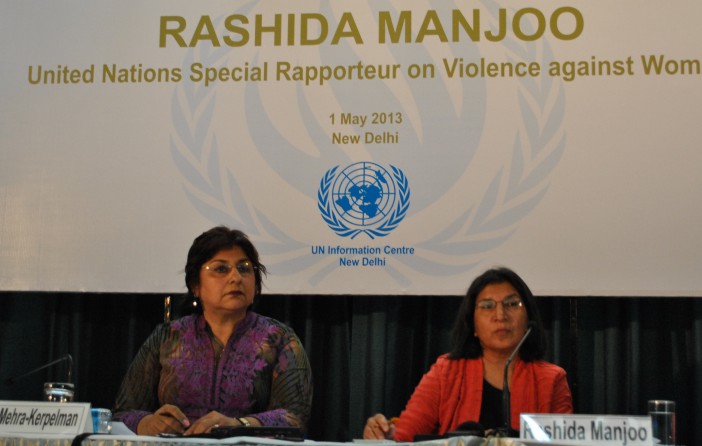In the midst of South Africa’s commemoration of Women’s Month, South African professor Rashida Manjoo has warned that the global struggle for women’s rights is far from over. Prof Manjoo is also the United Nations Special Rapporteur on violence against women and is described as “one of the world’s top experts and combatants of violence against women”.
Prof Manjoo is an academic at the Department of Public Law at the University of Cape Town. On the 8th August 2014, she was awarded the International Human Rights Award from the American Bar Association (ABA) Section of Litigation. The scholar was praised for devoting her career to “addressing the brutality and oppression rooted in inequality and gender-based discrimination”.
Speaking to VOC Drivetime, Prof Manjoo acknowledged that global progress was being made towards recognising the gender equality and non-discrimination rights of women, both in law and in practise. She noted that more than 150 countries across the world had gender equality and non-discrimination entrenched in their constitution. However, the challenge at present was the “disconnect between theory and practise”.
“We may have amazing legislation and more awareness that women’s rights are human rights. The challenge of course is practise and implementation, and giving life to the paper laws that we have in so many parts of the world,” she explained.
Prof Manjoo highlighted a disturbing trend in many countries, where there was a sense of disacknowledgement that women had the same human rights as men. She highlighted the use of religion, culture, and tradition as just one manner of justifying the ill-treatment of women.
India as a case study
India in particular, has long been regarded as a country where cultural tradition has out-muscled the basic human rights of women. However, these cultural barriers have been shaken in recent years, most notably as a result of the uproar that followed the brutal gang rape of a Delhi woman in 2012.
Prof Manjoo said the incident served as a trigger that made visible a systemic and structural problem in the country. The incident raised the anger of Indian society to such an extent, that it became a catalyst for breaking the silence of women’s rights abuse.
“The Indian government did respond through law reform, which included the death penalty for rape cases. The government on the other hand has not responded to address the root, structural causes of violence against women in India, in the way that it should have,” she said.
There have also been high rates of women’s rights abuses in countries that have experienced episodes of political violence, including South Africa, and most recently Egypt. Manjoo suspected that in these post conflict areas, these incidents had became “privatised”.
“You are looking at societies where there is a prevalence of weapons, you have highly militarised men, and an inability of the state to protect people in public spaces because of the failing police systems. This does lead to a sense of insecurity,” she said.
Prof Manjoo is an advocate for a holistic approach to understanding and addressing discrimination and violence against women.
“The importance of accountability as the norm for acts of violence against women cannot be over-emphasised, more especially within a context of generalised impunity for violence in the public and private spheres.”
On a local front, during the Apartheid era, a significant number of women played critical roles in the struggle for freedom. In August, South Africans pay tribute to the thousands who marched towards the Union Buildings in August 1956. The march was considered a major turning point in the country’s battle against oppression and highlighted the role of women in the Apartheid struggle.
Prof Manjoo noted that there were seminal moments in the country’s history, apart from the 1956 march, where women have stood up and made their voices heard. However, she said there was a lack of honouring this memory amongst the majority of South Africans.
“We take it for granted that there has been this struggle, and we’ve move on. But if you analyse what the struggles were, whether it was about land, access to economic resources and opportunities, or a right to a life free of violence, these are struggles that continue today,” she said. VOC (Mubeen Banderker)






 WhatsApp us
WhatsApp us 

